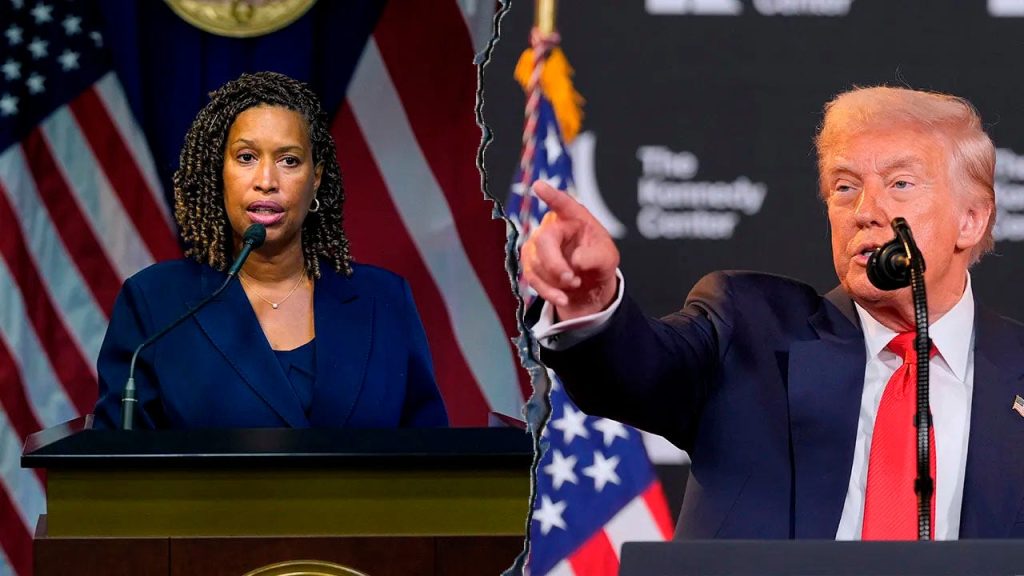Trump Praises DC Mayor Bowser for Cooperation on Crime Reduction
In a surprising turn of political goodwill, President Donald Trump recently commended Washington D.C. Mayor Muriel Bowser for her collaborative approach to addressing crime in the nation’s capital. This praise comes amid a controversial deployment of National Guard troops to the city as part of Trump’s federal crime crackdown initiative. Through a series of posts on his Truth Social platform, Trump highlighted what he sees as a successful partnership that has yielded significant reductions in criminal activity throughout the District. “Wow! Mayor Muriel Bowser of D.C. has become very popular because she worked with me and my great people in bringing crime down to virtually nothing in D.C.,” Trump wrote, setting a tone of bipartisan achievement that stands in stark contrast to his characterization of other Democratic leaders who have been more critical of his approach to crime reduction.
The President’s comments didn’t stop at praising Bowser; they extended to criticizing other Democratic governors and mayors who he believes have resisted federal assistance. Trump specifically called out Illinois Governor J.B. Pritzker, Maryland Governor Wes Moore, and California Governor Gavin Newsom, suggesting these leaders “spend all of their time trying to justify violent crime instead of working with us to completely eliminate it.” He reserved particularly pointed criticism for Chicago’s mayor, claiming she has a “5% approval rating.” These comparisons serve to highlight what Trump considers a model of cooperation in D.C. versus obstruction elsewhere, framing the issue within his broader law-and-order messaging that has been central to his political identity. The juxtaposition of Bowser’s approach against that of other Democratic leaders creates a narrative of pragmatic problem-solving versus ideological resistance.
According to Trump, this cooperation has translated into tangible political benefits for Bowser. He claimed her approval rating has increased by 25% in a short period, with D.C. residents expressing gratitude for the improved safety conditions. “It’s not a miracle, it’s hard work, courage, and being smart,” Trump wrote, suggesting that the success in D.C. could be replicated elsewhere if other Democratic leaders would embrace similar cooperation. He also referenced past collaborations with law enforcement in Los Angeles during periods of civil unrest, claiming that federal intervention was crucial in maintaining order and potentially securing the city’s bid to host the Olympics. This framing positions federal intervention not as an overreach of authority but as necessary assistance that local leaders should welcome rather than resist.
Mayor Bowser herself has acknowledged significant improvements in public safety metrics since the federal surge began. At a news conference last Wednesday, she reported that carjackings have decreased by an impressive 87%, while violent crime overall has dropped by 45%. Arrests have increased by 20%, and illegal gun recoveries are up 12%. “The most significant thing that we are highlighting today is the area of crime that was most troubling for us in 2023, and we have driven it down over the last year,” Bowser stated. Her emphasis on how these improvements impact residents’ daily lives was clear: “We know that when carjackings go down, when the use of guns goes down, when homicide or robbery go down, neighborhoods feel safer and are safer.” These statistics provide concrete support for the effectiveness of the controversial approach, regardless of the political tensions surrounding it.
The scope of the federal crime crackdown appears substantial, with Attorney General Pam Bondi reporting that 1,599 arrests have been made and 165 illegal guns have been seized since the initiative began. These numbers suggest a significant intensification of law enforcement activity within the District, raising questions about sustainability, community impact, and the appropriate balance between federal and local authority in addressing urban crime. While the raw numbers demonstrate activity, the long-term implications for community-police relations and the root causes of crime remain to be seen. The approach represents a test case for a more aggressive federal role in local law enforcement matters, potentially setting precedents that could reshape federalism in practice.
Looking beyond Washington D.C., Trump has threatened to deploy National Guard troops to other Democratic-led cities facing crime challenges. This expanded vision suggests that the President views the D.C. approach as a model that could be applied more broadly across urban America. His closing message to Mayor Bowser – “Congratulations to Mayor Muriel Bowser, but don’t go woke on us. D.C. is a giant victory that never has to end!!!” – reveals both the conditional nature of his praise and his view that ideological differences remain despite the pragmatic cooperation. The D.C. experience thus stands as both a potential blueprint for addressing urban crime and a microcosm of the complex interplay between federal authority, local governance, and partisan politics that defines so many aspects of American public life today. Whether this model represents a sustainable path forward or a temporary alignment of interests remains an open question as cities nationwide continue to grapple with public safety concerns.


